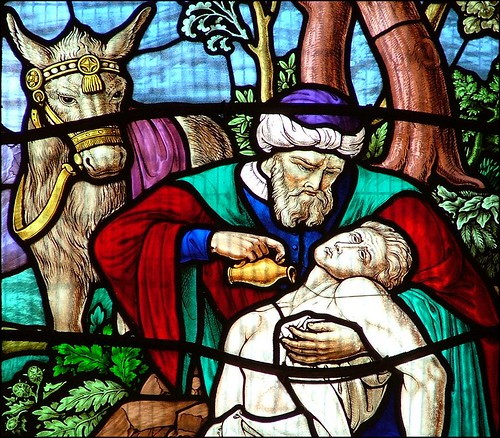 This Sunday’s readings, especially the 1st and the Gospel point us in the direction of hospitality. How should one be hospitable? In the 1st Reading—we read of Abraham and Sarah going out of their way to make sure their guests tasted their hospitality: it was at the warmest time of the day, Abraham saw them and he ran out to greet them with a bow to the ground. At their tent, both Abraham and Sarah offered the guests choice cuts and fine food. The Gospel too is a showcase of hospitality where Martha and Mary welcomed Jesus to their home. But, this comes with a twist. And it is this twist that fits into what we have been doing over this weekend at Maranatha Retreat House.
This Sunday’s readings, especially the 1st and the Gospel point us in the direction of hospitality. How should one be hospitable? In the 1st Reading—we read of Abraham and Sarah going out of their way to make sure their guests tasted their hospitality: it was at the warmest time of the day, Abraham saw them and he ran out to greet them with a bow to the ground. At their tent, both Abraham and Sarah offered the guests choice cuts and fine food. The Gospel too is a showcase of hospitality where Martha and Mary welcomed Jesus to their home. But, this comes with a twist. And it is this twist that fits into what we have been doing over this weekend at Maranatha Retreat House.This twist is not found in “whom” Jesus seemed to have favoured in the Gospel. Over the centuries, when religious life was still appealing, this passage would be used to support the choice that one ought to make, that is, to embrace a contemplative life. And for the few of us who have come away from the hustle and bustle of parish activities in order to pray and be near the Lord, you can say that the Gospel suits us just fine. We are embracing what Mary embraced, the contemplative life.
Now, if the twist were not to be found in the choice that Jesus seemed to have favoured, then what? Perhaps, better than the choice one ought to make—contemplation or action—it would be good to see how both Martha and Mary are linked to a search that is human.
As human beings, we do not just search but we all search for the best. If you like, built into this search is a drive for excellence. Do you remember that our conversations at table were centred on food? All through the day, we search for the best vegetarian restaurant even if this search may be limited to one person in our group of retreatants. Others search for the best "pan-mee" [1] in town, etc. But, our search is not just limited to food. Even as we labour through our bowl of "pan-mee" or our vegetarian “charsiew”, the world of medical science is searching for the best cures to many genetic defects people inherit or how best to improve the recovery of a severely brain-damaged person. In the field of technology, the search continues for how much more information can be fitted into a smaller space, etc.
As we search to excel, what is the measure of this search? A measure most familiar with us is change. It is not that change is sought for in itself but rather change is a useful criterion to show that the search is alive. Talk to a person in a bank’s treasury department as he or she watches the screen. The most exciting thing is when the blip on the monitor is going up and down. When there is no change, it would seem that the search is dead. When there is no change, we associate the search to be somehow stagnant.
This is where we make a shift. Excellence is not just found in “destruction”, meaning, the measure of our search is not found in this constant drive to change. It is also found in “construction” or consolidation. It means that we can also excel at doing what we do always. Change is not the only tell-tale sign that we have made progress. [2]
And so, Martha and Mary typifies a problem that we encounter today. The usual interpretation to Mary choosing the better part serves to highlight that contemplation or being is better than action or doing. This interpretation does not serve us well. Should it not be a question of the balance between the two? But there is more to this act of balancing.
In our search for excellence we have lost touch with ourselves. We are driven by the search for solution to almost any imaginable problem we have. We are just driven. But, the search is hinged not on the solution sought only. It must be hinged on the truth and importantly, in our contemporary world, it must be hinged also on meaning. For example, the scientists in search of the secrets of the atom did not stop to think whether their pursuit of knowledge served the truth but were driven until after the explosion at Nevada. Then, only then, did they realise that they were guided not by the search for truth but only by this insatiable desire to test the limits of their knowledge.
The search for excellence must be guided by whether what we search for will lead us to truth… Is it true? Will I be a better person because of what I know?
Today, we lament that the Sacrament of Confession is “dead”. But, we are so much more “confessional” than we are conscious of. The whole “Why confess to a priest when I can confess to God directly” is unacceptable if you consider the many public confessions people make unconsciously. Reality TV is not the only form of “public confession”. Phones-in to reveal your spouse’s secrets is another form of public confession. In a sense, we are crying out to be heard. There is this incessant crying out to be heard, to be known, to be loved, to be embraced… “Lord, do you not care that my sister has left me to do everything by myself”? [3] When the clamour to be heard is overwhelming, it is a tell-tale sign that we have become Martha. We cry out like Martha because we are too caught up with change. Our search for excellence is too characterised by “change” [4]. Perhaps this may explain why in the return to tradition that gives life, people often mistake “being unchanging” as tradition when in actual fact, tradition does change.
For ordinary life to go on, Martha is necessary because she represents the progress we need. Mary, however, typifies the one who sits before the Lord in order to listen. I often say I hear confessions but in reality, I listen to what is not being said in confession. Mary is important not because she is better than Martha but because Mary listens in order to become who she is supposed to be. Proper change must be marked by deliberate periods of listening. As we cross the cusp of the 50th Anniversary, there will be many activities. As we celebrate, take a look at the World Cup 2010 that has just concluded. It is over and the world is literally littered with excess memorabilia of the event. Some would not even wear their WC tee-shirts past 2010. The world seems fixated with “events” after “events” with the result that when they are over, we are left with a hang-over and an emptiness which only another event can fill. It would be good to know that like Martha, we can get lost in the things to do rather than remember like Mary, to become a people we are supposed to be. Listening allows our search for excellence to arrive at who God has called us to be.
In order to be that, so much more listening is called from us. And as leaders, we continue to make that call to our people so that what we hope for for the 50th anniversary will be fulfilled.
FOOTNOTES:
[1] Noodle made from flour mixed with water. It is either “pinched” from a bunch of dough and thrown into boiling soup stock. In the case of "pan-mee", the same dough is passed through a press that cuts the sheet of flour-dough into strips of noodle.
[2] For example, in celebrating a wedding yesterday, I told the marrying couple that the main quality of tradition was not because it was unchanging. We embrace tradition not because it is unchanging but because it can “hold” us together. When it holds us together, it gives us life and that is why we embrace it.
[3] The concern for change may just breed what is called activism.
[4] I am beginning to understand why the Church is often perceived as slow in a media-induced frenzy to “action”. How many of our “actions” are based on our reactions to media-controlled exposés? Look at the current exposé on homeless children and immediately it has become a national priority to solve child homelessness. On the other hand, the slow response on the part of the Church may be an imitation of the posture of Mary, of not rushing in but of listening to hear what more there is to hear.


